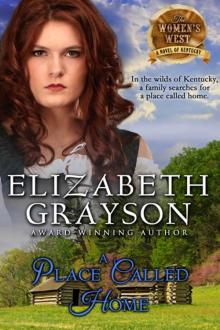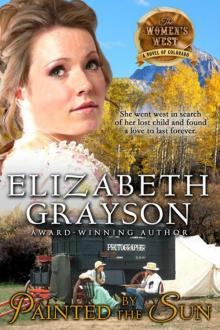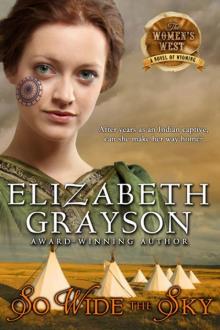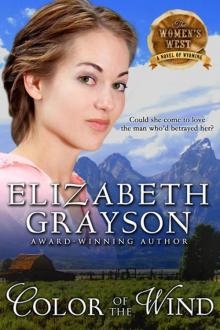- Home
- Elizabeth Grayson
So Wide the Sky Page 4
So Wide the Sky Read online
Page 4
Sweet Grass Woman did not remember that white women wore so many clothes when she was a girl.
Sylvie Noonan wrestled a dark blue skirt down over the mound of underskirts and Alma Parker buttoned the matching bodice all the way up the back. It took the three of them working together to force her feet into the stiff black boots that laced halfway up her shins.
How did white women accomplish anything trussed up in all of this? Sweet Grass Woman wondered, hoping they were finished.
But while Alma and Sylvie emptied the second tub of water out the kitchen door, Sally McGarrity took up a brush and began on Cassandra's hair. She dragged the thick mane this way and that, combing and coiling. Finally she twisted it into a knot on top of her head and stabbed it in place with hairpins. They put earrings in one of the holes in her ears, and fastened a small gold-colored flower to the rise of her breast.
They fussed and tweaked until she was done to their mutual satisfaction, then stepped back to admire their handiwork.
Sweet Grass Woman sat very still. In truth she could barely breathe for the constriction around her ribs and the high, stiff collar. Her feet were going numb in the high-topped shoes, and each and every one of the hairpins was poking her scalp. She felt like a wildflower that had been plucked and pruned and painted until no resemblance to what she had been remained.
After a flurry of whispers that seemed to indicate that the women were satisfied, Sylvie Noonan lifted the ivory-backed looking glass.
Sweet Grass Woman was gone from the mirror's silvery surface, dissolved in a barrel of bathwater. Nor had the girl who had inhabited this body years before appeared in her place. The woman reflected within the ivory frame appeared to be white, with heavy, gold-streaked hair, a sprinkling of freckles across her nose, and calm, pale eyes. She wore a high-necked gown that was trimmed with lace and seemed to affect an air of cool disdain.
Only one thing spoiled the image in the glass. This lady bore a dark tattoo.
* * *
Cassandra Morgan.
Cassie Morgan.
Cass Morgan.
Hunter Jalbert sat with his back to the proceedings and considered the woman being bathed and dressed and civilized in the room behind him. He couldn't help liking what he'd seen of her so far—and he'd seen a good deal more than any of them intended.
He fought down a grin of pure masculine appreciation as he recollected bursting into Major McGarrity's kitchen expecting blood and mayhem, and finding two of the officers' wives rolling around on the floor with their naked charge. Just one quick glimpse of that long slim torso and those shapely legs had convinced him that whatever else she was, this Cass Morgan was a fine-looking woman.
And one with grit.
She couldn't have survived nine years with the Indians if that weren't so. He liked the way she'd held her peace while Standing Pine was negotiating her release. She'd handled herself with dignity once they returned to the fort and hadn't let either Ben McGarrity or Drew Reynolds intimidate her. And when Alma Parker had incinerated her wedding dress, she'd behaved far more reasonably than any of them had a right to expect.
Hunter rubbed at the back of his neck with one broad hand. He could never reveal that Cassandra Morgan had been married to a Cheyenne, that she might even have borne him children. He could never let on that her Cheyenne husband probably hadn't been the first man to take her. Whites never seemed to grasp that a woman captive had no choice about submitting. It was that or die, either by Indian torture or her own hand.
Explaining it wouldn't keep these well-meaning wives from judging her, or labeling her a whore for doing what she'd had to do.
As if the tattoo on her cheek wasn't label enough.
Hunter shifted in his chair, suddenly impatient. He'd spent the whole damn afternoon dancing attendance on these four women. He did have other concerns, concerns that—
"Mr. Jalbert?" It was Sally McGarrity's voice, sounding uncertain and hopeful. "Mr. Jalbert, what do you think of our Cassandra?"
Hunter turned from his long, fruitless perusal of the McGarritys' parlor. And caught his breath.
Before him stood a woman whose thick-coiled hair shone the rich, golden brown of buckwheat honey; whose sun-kissed cheeks glowed pink with recent scrubbing; whose eyes were the clear, pale green of a forest pool. She wore a gown of violet-blue that defined her narrow waist and embraced the curve of her breasts in a way any man alive would like to.
In the bathing and dressing and primping, Sweet Grass Woman had disappeared. Somehow Hunter hadn't expected to resent the transformation. He hadn't expected this sense of loss.
He hadn't expected the woman who took her place would be so beautiful.
"Mr. Jalbert?" Sally McGarrity's voice came again, more uncertain, less hopeful. She wanted reassurance—for both Cassandra and the three of them.
Hunter grappled with his feelings, trying to dredge up the kind of compliment women longed to hear.
"Mistress Morgan," he said, once he'd unglued his tongue from the roof of his mouth, "I can't think when I have seen a lady more lovely than you."
The words were trite. Abashed, tongue-tied men must have mumbled them a million times, yet the three wives beamed.
Cassandra stared, a line of concentration between her brows. He repeated the words in Cheyenne, just for her.
A small, slow smile appeared on her face, a smile that held so little hope and so many grave misgivings.
Before any of the women could respond, Ben McGarrity came banging into the house. "That girl decent yet, Sally?" he demanded as he barreled through the parlor and into the kitchen.
Hunter stepped back to give him room.
"We've scrubbed her clean and given her something respectable to wear," Mrs. McGarrity assured her husband.
The major pulled up short and made a perusal of the women's handiwork. "You've done a damn fine job, by the looks of her. Turned her into a regular buckskin Cinderella."
"Cinderella?" Cass whispered as if from somewhere long ago she remembered the name. Judging from the tentative curl of her lips, she must have guessed that the major was issuing compliments.
A wave of damp, suffocating heat rose in Hunter's chest. He wasn't sure if this woman was someone he should pity or vow to protect. What he did know was that he had to get away, out to where the wide, windy sky was growing dark.
Before he could make good his escape, the major turned to him. "Jalbert, if you don't mind, I'd like you to stay on to supper. We'll be keeping Miss Morgan here with us, at least until we determine whether she has family somewhere. We need your help to make her understand that."
"Well, sir, it's not that I don't appreciate why you want me here, but I do have other duties..." Hunter was never included in fort society, and the unexpected invitation to dinner made him uneasy.
"Damn your other duties!" The major's scowl brought his eyebrows together. "You hired on as a translator, didn't you? Then consider this an order: stay to supper."
"Yes, sir," Hunter answered begrudgingly.
While the two men were concluding their negotiations, Alma Parker and Sylvie Noonan had been putting on their shawls and gathering up their things.
Sylvie paused on her way to the door to pat Cassandra's shoulder. "I know all this seems strange to you, dear, but you'll feel at home here soon enough."
Alma Parker frowned and followed Sylvie out the back door.
It had barely closed behind them when Private Montgomery, the major's striker, came in carrying a covered pot and a basket of sundries to complete their evening meal. While the enlisted man, who worked as the McGarritys' servant, set supper on the hearth and began laying the table, Sally ushered everyone into the parlor.
It was furnished in army-outpost style, with a battered settee, two mismatched chairs, and several much-mended tables. But Mrs. McGarrity had added special touches of her own. The embroidered homily, "Home Is Where the Heart Is," hung over the fireplace. A fine brass lantern clock, several daguerreotypes of men in uni
forms, and a troop of ceramic dancers were arrayed across the mantel. A snarling bearskin rug took up most of the floor.
Hunter motioned Cassandra to one of the chairs while Mrs. McGarrity lit the oil lamps.
"Have you found out any more about where Cassandra comes from?" Sally asked her husband. "Does she have family back East?"
The major settled himself on the creaky settee. "Captain Reynolds told me he didn't think there was anyone left. I figured I'd send an inquiry telegram to Kentucky anyway, in case there's a branch of the family Reynolds doesn't know about."
"Ken-tuck-ee?" Cassandra asked softly.
The three of them turned to stare at her.
"Ken-tuck-ee?"
"What about Kentucky?" Hunter prompted in Cheyenne.
"It is where we came from. Where Drew and I grew up," she answered in the same language.
"Do you have kin left back there?"
Cassandra shrugged. "Did my parents survive the attack on our wagons?" she asked, her face intent.
"Didn't you see what happened?"
"I thought I did," she answered. "But I thought I saw Drew die, and now I know he did not."
Hunter could sense the glimmer of hope in her and couldn't bear to extinguish it. "Maybe Captain Reynolds can tell you what happened," he reassured her. "We'll ask him tomorrow."
Hunter translated the conversation for the McGarritys.
"But surely Captain Reynolds would have told us if there was anyone left," Sally McGarrity said, concern in her voice. "If Cassandra doesn't have family to take her in, whatever will become of her?"
That question weighed on each of them as they sat down to a supper of spicy venison stew, baking powder biscuits, and apple tart. It was the best food Hunter had ever encountered in the military, but Cass Morgan and her fate prevented him from giving it the attention it deserved.
Sally McGarrity was right. Without a family to offer her protection, where could Cassandra go? Marked with that tattoo, she would never fit in, either here on the frontier or back in the States. How would she make her way in a society that would never accept what she'd become, in a world that had changed in the last nine years even more than she had?
Hunter found his gaze drawn to Cassandra often during the meal. He watched as she ate, the way she adapted to what the McGarritys seemed to expect. She bowed her head for grace. She took note of Sally McGarrity's table manners, picking up her spoon only when Sally did, wiping her mouth with the napkin when she was done.
Was Cassandra remembering or mimicking? Hunter wondered. Was she a white woman who had become an Indian, or an Indian who must now become a white woman?
That she was still alive proved that she was able to adapt to whatever came.
When the meal was finished and the dishes had been cleared away, Sally McGarrity rose and gestured for Cassandra and Hunter to follow her. She showed them to an alcove at the back of the kitchen that had been partitioned with a drape of army blankets. Beyond it stood a packing crate washstand, a straight-backed chair, a narrow iron bedstead, and a battered trunk. Judging from the fatigue pants and the empty gun belt left hanging on a peg, the major's striker was being displaced, sent back to the barracks for the duration.
"Tell Cassandra this is where she will be sleeping," Sally McGarrity instructed, pointing to the bed made up with linen sheets, a faded quilt, and a buffalo robe. "Tell her her things have already been put in the trunk, and that there is a nightdress in there for her to wear."
Hunter did as he'd been bidden.
"Tell her that if there is anything she needs, she should just call out, and either the major or I will come to her."
Cassandra nodded in acknowledgment when Hunter was done.
"And then tell her good night," the major's lady instructed. "We turn in early."
Hunter sought Cassandra's gaze, struggling with a need to touch her, to reassure her. To tell her somehow things would be fine, though he had no right to promise that.
"Good night, Cass Morgan," he said instead.
She curled her lips in a slow, sweet smile. "Good—night—to you, A-lain Jal-bert," she whispered in halting but perfectly adequate English.
Chapter 4
Drew Reynolds tossed his hat on a hook to the left of the door and followed the rocking chair's rumbling rhythm through the parlor to the kitchen. He found its occupants as he knew he would. Lila Wilcox was ensconced in the creaking chair. His daughter Meggie was wrapped in the quilt her mother had made her, snuggled up in Lila's arms.
Lila raised her chin from where it had been resting on Meggie's white-gold curls. "She stayed awake waiting for you as long as she could."
Drew heard the disapproval in Lila's voice and let out his breath in a sigh. "Meggie's just going to have to understand that some things keep me from being home with her."
Tonight that had been writing a report for the War Department on the skirmish that had taken place with the Cheyenne this afternoon, and the repercussions it was bound to have. Disastrous repercussions—at least for him.
"Begging your pardon, sir, but how would a child just barely four years old come to understand your working every day from Reveille 'til well past Taps?"
Of course Meggie wouldn't understand, Drew acknowledged. But what was he to do? The army didn't make provisions for widowed fathers. God knows it didn't make provisions for any officer's family beyond their designation as camp followers.
Drew deliberately turned from Lila Wilcox's uncompromising frown, dipped water from the bucket near the kitchen door, and took a drink. If Laura hadn't died on the long trek west, Drew found himself thinking, if Fort Carr wasn't set down in such a godforsaken place, if either he or Laura had kin back in the States, he'd have already made arrangements for someone more suitable than the company laundress to look after his daughter.
When it became clear Drew wasn't going to answer her, Lila Wilcox went on. "And what about my own duties? With you keeping me here so late, how am I to get my wash done? Meggie or no, the men still want clean clothes."
If there were anyone else to care for Meggie, Drew would have sent Lila back to her washing. At first the officers' wives had taken pity on them and had looked after Meggie during the day, but none of them had offered to make the arrangement permanent. The other laundresses at the fort had more than enough to do looking after their own ragtag bands of children. Only Lila and her infantry sergeant husband, Will, had already raised their four sons to manhood.
"Well, then," Drew answered, turning to her with a sigh, "don't you think you'd better go and spend some time bent over your washtubs?"
"In the dead of night and weather as cold as this?"
Drew took Meggie in his arms, relieving the laundress of any reason to stay.
Lila accepted the dismissal and heaved her ample self to her feet. But before Drew could usher her out the door, she turned to him. "I hear tell you brought an Indian captive back with you this afternoon."
Drew nodded, determined not to let Lila suspect the way his belly clenched in response to her inquiry. In a community as insular as this, there were no secrets. Still, Lila Wilcox seemed to know more about everybody's private relationships than anyone should.
The entire garrison had seen him bring Cassie Morgan into the fort and heard him claim to have known her long ago.
Even those who had not gathered before McGarrity's office knew by now that the Cheyenne had used the promise of her exchange to lure the small detachment of cavalry into a trap.
Drew had said all he intended to say about that and about Cassie, but Lila would want to know more. And Drew refused to provide gossip for Lila to share over the laundry tubs in the morning. He positively refused to give any hint that Cassie's return had stirred up the caldron of dark emotions inside him.
"What did you hear?" he asked the tall, rawboned woman before him.
Lila's eyes narrowed. "That the woman was a Cheyenne captive. That they tattooed her with some heathen design. That no matter how she scrubbed, Alma
Parker couldn't get it off."
Drew bit his lips to hide a smile. Alma Parker would consider it a personal affront that a white woman had been marked in such a way and would take it upon herself to eradicate the tattoo however she could.
For Cassie's sake, Drew wished she had succeeded.
"I heard," Lila went on when Drew remained silent, "that the woman returned from the Indians is someone you know."
"Our families came west together years ago," was all Drew said. He wasn't about to reveal more about the attack than he already had. From the day he'd left Fort Union for West Point nine years before, he hadn't spoken about it to anyone.
"Well, Lila," he said, shifting his daughter in his arms, shifting the woman's attention to safer concerns. "I suppose it's time I put Meggie to bed. Take the morning at your tubs, if you need it. I'll keep Meggie with me or have one of the enlisted men look after her."
"Very well, Captain Reynolds." Lila tightened her shawl around her shoulders and opened the back door. "Good night."
Drew hugged his daughter close as a swirl of winter cold swept through the room.
Once Lila was gone, he made his way through the parlor to the alcove off his bedroom where Meggie slept. He pulled back the sheets and woolen blankets and settled her in the narrow iron bed. He stood for a moment looking down at her. Asleep, his daughter looked the perfect angel. Awake, she was a child, a responsibility, a problem Drew didn't know how to solve.
If only Laura had lived...
Drew cursed the useless regret and bent to stroke his daughter's hair. It was gossamer, like threads of spun silver and gold. "We'll find a way through this, Meggie-girl," he whispered. "I promise you."
His daughter stirred as if she'd heard, shifted beneath the covers, and settled again.
Bless the simplicity and innocence of children that they should sleep so soundly, Drew thought standing over her. He certainly wouldn't sleep this night. He wouldn't dare close his eyes. He never slept when something happened to remind him of the massacre. And tonight, after Cassie Morgan's return, it would be worse than it had ever been.

 A Place Called Home
A Place Called Home Painted by the Sun
Painted by the Sun So Wide the Sky
So Wide the Sky Color of the Wind
Color of the Wind